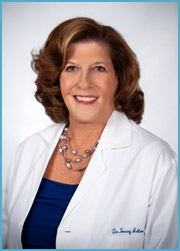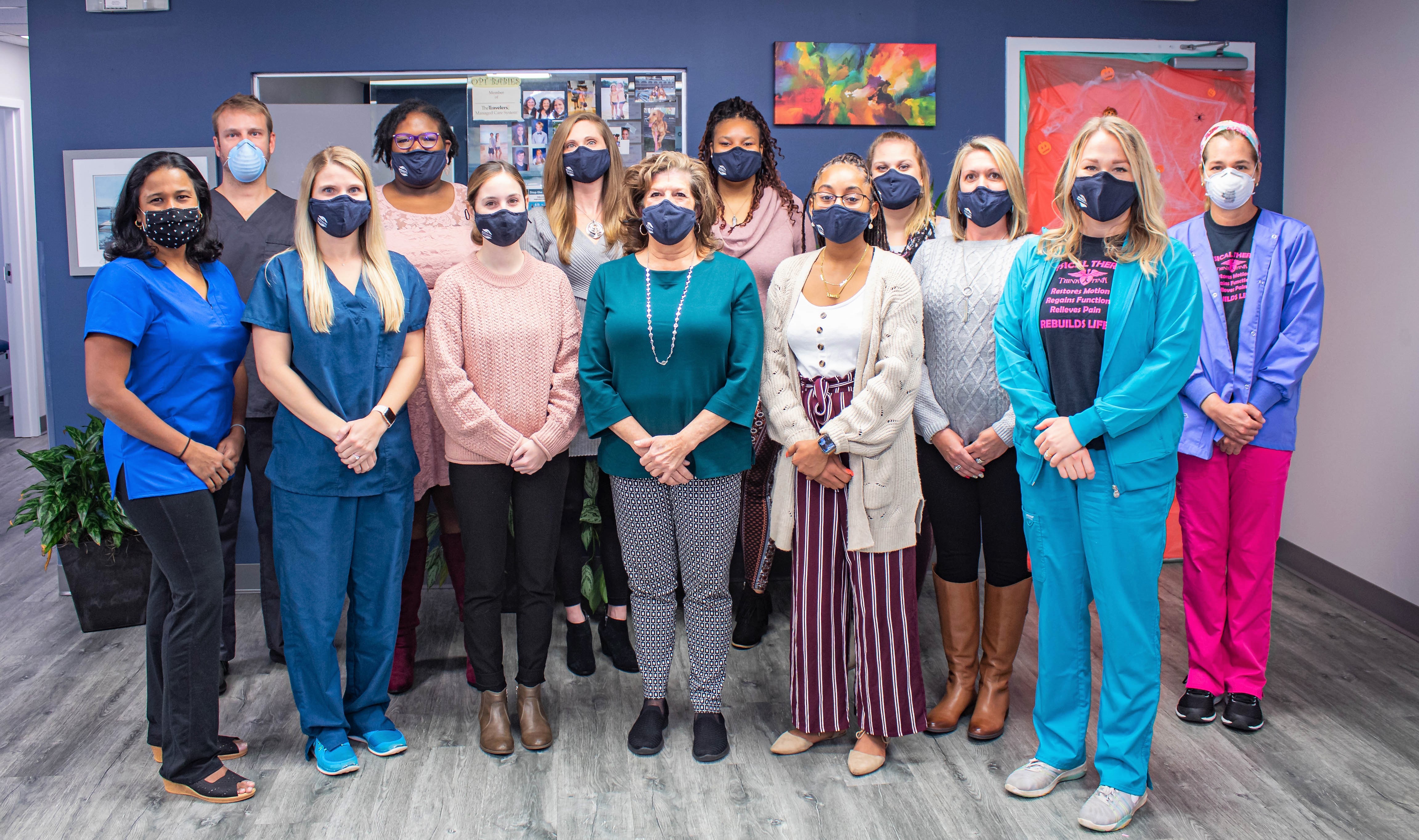Alumni Spotlight - Dr. Tracey Adler
 We recently had the opportunity to talk one on one with Dr. Tracey Adler, a physical therapy graduate of the College of Health Professions, (formerly known as VCU’s School of Allied Health Professions).
We recently had the opportunity to talk one on one with Dr. Tracey Adler, a physical therapy graduate of the College of Health Professions, (formerly known as VCU’s School of Allied Health Professions).
Adler is the director and owner of Orthopedic Physical Therapy, Inc., which specializes in manual therapy and hands-on treatment. She earned a Bachelors in Physical Therapy from Georgia State University in 1979, a Master of Science in orthopedic physical therapy in 1984 and Doctor of Physical Therapy in 2007, both from Virginia Commonwealth University.
Born in Carmel, Ca. to a Navy family, Adler and her family lived in numerous places, including England, Rhode Island and Northern Virginia.

Dr. Adler (center) and her team at Orthopedic Physical Therapy, Inc.
What are your thoughts on growing up in a military family?
I feel like growing up in a military family shapes you in a good way, and makes you learn how to be adaptable. You learn how to make new friends and interact with people easier. It makes you very open and tolerable. I never grew up with any kind of prejudice, because I lived in different places and met all kinds of different people. I believe all of these opportunities taught me how to adapt quickly in different situations.
When did you know you wanted to become a physical therapist?
I decided when I was 13 that I wanted to be a physical therapist. We were living in Northern Virginia, and a family friend of my parents had a disabled child. The family happened to ask if I would be interested in volunteering, and I wanted to take part in the opportunity. For three summers in a row, I volunteered at a day camp for disabled children. The first week I was there, I knew I wanted to be a physical therapist, and I never changed my mind.
Tell us about your education.
I attended Mary Washington for the pre-physical therapy program, and initially thought my path would begin at Virginia Commonwealth University (formerly known as Medical College of Virginia), however I was not accepted there. At the time there were only 17 PT schools in the entire country. I went to Georgia State for PT school, which is where I earned my Bachelor’s degree. Afterward, I worked for two years, knowing I wanted to obtain a master’s degree. There were three programs in the country that offered an orthopedic masters in PT. These included Chicago Medical School, Pittsburgh and VCU. I was accepted into all three programs, and ultimately chose VCU.
Her thoughts on how the inter-collaboration of programs helps prepare PT students:
I believe it’s important to experience what other allied health professions are out there, and how your discipline can collaborate with others. I would go even a step further and say there needs to be more integration between allied health and medicine, because not everyone in the medical community has understood the role of allied health professionals. For example, I once had a family practice doctor in town who had an orthopedic resident doing an internship with him. The doctor suggested to the intern that he spend a week with me in order to gain a better understanding of the physical therapist’s role. Even if you’re an orthopedic surgery resident, it is important for you to have a better idea of what can benefit patients.
How has the field of physical therapy evolved?
When I finished PT school, I think we were viewed more as technicians. Today we’re regarded as independent practitioners. A patient can see a physical therapist without first having to see his or her doctor, and we provide a physical therapy diagnosis. Physical therapists are essentially an entryway into the health field, and no longer just an extension of care. I think this is by far, one of the biggest things that has changed within the field.
Additionally, Direct Access is available for patients. This means that licensed physical therapists in Virginia can evaluate and treat any patient, for a maximum of 60 consecutive days without the requirement of a referral from a medical professional. Direct Access empowers patients by giving them a choice, and allowing them to receive the physical therapy they need immediately, without avoidable delays. For more information regarding Direct Access, visit the Virginia State Board of Physical Therapy
How do you feel your education prepared you for what you do today?
It started with my Bachelors program at Georgia State, because there was a professor there who wanted PTs to learn manual therapy. At the time, in the 1970’s, manual therapy training was not taught at any PT school in the country. I completed my Bachelor’s program with skills that most PTs didn’t have or couldn’t get. One of the reasons I wanted to pursue those skills, and why I came to VCU, was because they recognized these specialties in physical therapy – orthopedics, and manual therapy. I learned these specialties and expanded my skills to include dry needling – a type of therapy involving penetration of the skin to treat underlying muscular trigger points for the management of pain and movement impairments. I did my doctorate because I wanted, not just to keep up with who was coming out in the field, but because I wanted to learn more about pharmacology, radiology, and other things I didn’t learn during my undergraduate studies.
Inspirational People:
My most memorable professor was Gordon Cummings from Georgia State. Professor Cummings taught me manual therapy, and this really set the tone for the rest of my career. When I came to VCU, they were open to the orthopedic specialty. This helped enhance my knowledge, skills and research on dry needling. When I was completing my doctoral training, there was a lot of self-study, but the opportunity to work with everyone was so helpful.
Her role on State Board of Physical Therapy:
I’m currently in my 2nd term, and was appointed by the governor. I was at a point in my career where I felt I had time to do this. I had a base of knowledge and experience, and I’ve always been very proud of our profession and I wanted to be able to give back. The board members and I are there to ensure that our colleagues continue to serve our communities from the highest standards possible.
Being a good listener and advocate for the patient
My practice is not like every other practice in that we are one on one with our patients for 30 minutes to an hour depending on their scenario. This gives patients the opportunity to talk with us about their situations and allows us to spend more time getting to know them. I believe we are able to establish a level of trust in that we listen to our patients and they feel like they are being heard. With other specialists, there may not be additional conversation about anything else connected to the reason why they’re coming in. As a result, I feel like patients really count on us.
We are a different type of practice. The hope is that patients are coming to us for our hands and our brains, as opposed to the equipment. Our ultimate goal is to get to the source of your problem, and not just treat your symptoms. I look at everything to find out all of the possible sources of pain, and really dedicate ourselves to looking at a patient holistically.
What do you want people know about PT?
The field of PT in general has expanded in many ways. When I opened the practice in 1984, we were one of the first practices in town to do anything with women and pelvic pain and urinary incontinence, as well as men. There are techniques we use, such as dry needling, which I have been doing since 2003. We are trying to encourage people to see a physical therapist, to be more preventative – such as before beginning an exercise program, so you don’t end up getting injured. There may be things a patient is not aware of and should address before initiating a new physical activity or program.
Outside of PT
I love to cook, and do a lot of walking and yoga. I have a dog named Sammy who is at my office every day, and patients love him.
As for my family, I have twin daughters in their 30’s who live on opposite sides of the country. My parents are in their 90’s and live nearby in Richmond.
Her message to aspiring PT professionals
In this field, you have a lot of interaction with your patients. You can see how patients improve, or sometimes they may not. Regardless, I really feel like we make an impact on people’s lives. We’re there for our patients, and they may talk to us more than they might talk to their physicians. In my practice, we specialize in people with pain, but in general, I believe physical therapy has so many avenues and a lot of options where you can really specialize within the profession.
This month, I am celebrating 42 years of practice, and I love what I do. To me, this is not a job as I love seeing my patients. At the end of the day, I believe that everyone has a gift. Sometimes people find their gift and it matches their profession. If you are able to connect with people, you have empathy, are great at science, then this may be the profession for you.